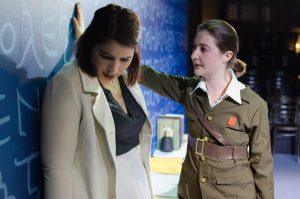Before Lysistrata
 |
| Photo by Zaina Ahmed |
Montague Basement in association with bAKEHOUSE Theatre presents, BEFORE LYSISTRATA, by Ellana Costa, at the Kings Cross Theatre (KXT), Kings Cross Hotel, 11 – 22 July.
BEFORE LYSISTRATA is a new Australian play, by Ellana Costa, presented by a dedicated young company of artists, Montague Basement.
LYSISTRATA, a play by Aristophanes, written in 411 BC, tells of the women of Athens and Sparta who decided to withhold sexual activity until their men gave up a war and made peace.
BEFORE LYSISTRATA, is a contemporary prequel by Ellana Costa, a speculative fiction presenting the journey of the women/wives of Pericles and Archidamus: Lysistrata and Lampito, during the declaration and warring of the two nation states Athens and Sparta in what we know as the Peloponnesian War, and how they came to the joint call-for-action heralded in the famed comedy of LYSISTRATA.
In this play, initially, both women make public championing speeches for their country’s cause – positive propaganda – encouraged, strategically, by their condescending and bullying war lords/husbands, who use the ‘soft power’ of the female perspective to keep the states in conflict. But, as the war rages on, and both sides suffer great losses, including the personal loss and risk to their own children, the women begin to question and challenge, at great cost to themselves, the values that underpin this need for war. Though enemies, the rival women find that they have concerns that ought to bind them – that the face to face conversation can de-demonise the enemy and allow/permit an embrace, instead, to a common, concerned humanity – to peace.
(It is the lesson of the new and highly prized play, OSLO, by J.T. Rogers – a play dealing with the 1993 Oslo Accords between the Israelis and the Palestinians – soon to open in London after a season in New York – the 2017 Tony Award winning play. When for Sydney, I wonder? It has a cast of more than 10 and is very intelligent and provocative, with only a few laughs – so-o-o, probably, never!)
In this traverse space in the KXT one wall has ancient Greek script covering it, on the other, there are presented documentary images of modern warfare (one being, a truly frightening video compilation of the politicians and generals of the wars of the last century), and, including, pithy quotations from Thucydides’ great book: THE HISTORY OF THE PELOPONESSIAN WAR: e.g. “self-control is the chief element in self-respect, and respect of self, in turn, is the chief element in courage”; “so little pains do the vulgar take in the investigation of truth, accepting readily the first story that comes to hand”. In fact the structure of this drama reflects, sometimes, the means that Thucydides used in his History construct (i.e. the direct speech forms).
The Director, Saro Lusty-Cavallari, has employed some very inventive activities for the many scenes of the writing to present the arguments and expositions of the characters of Ms Costa’s passionate vision statement. Ms Costa says in the program notes:
BEFORE LYSISTRATA is about a lot of things. It’s about the role of women in leadership and about the inactive Left. It’s about the power of working together and the folly of elitism. It’s about us vs them, and realising there is no other side. It’s about what we can do right and what we have done wrong.
I gathered, that it may be about the sense of individual and social responsibility.
And, true, it may be about all those things and, perhaps, other things as well, but no matter the promising writing by Ms Costa and the invention of Mr Lusty-Cavallari, it all comes to nothing if the acting fails to deliver it. It is an all female cast: Michaela Savina – as Lysistrata, she is also the writer of the Story of the play; Alex Francis, playing a double male set of characters, Pericles and Archidamus; with the writer herself, Ellana Costa, as Lampito. And, although, they are committed and passionate, they are mostly only aspirational as actors, with observably underdeveloped acting skills – vocal and physical – and so fail, consistently, to bring this material to any gripping dramatic reality so as to capture and ‘keep’ an audience involved, interested. One of the primary skills of any Director is to be able to CAST well. Clearly this has not happened here – it has a ‘feeling’ of nepotism (a lovely word of Greek origin): patronage of ‘family’ relationship but not of merit. Their credits in the program have many projects in common – and it brings, unfortunately, this ambitious and laudable enterprise of BEFORE LYSISTRATA, undone – down. With better actors this play may be of more impact.